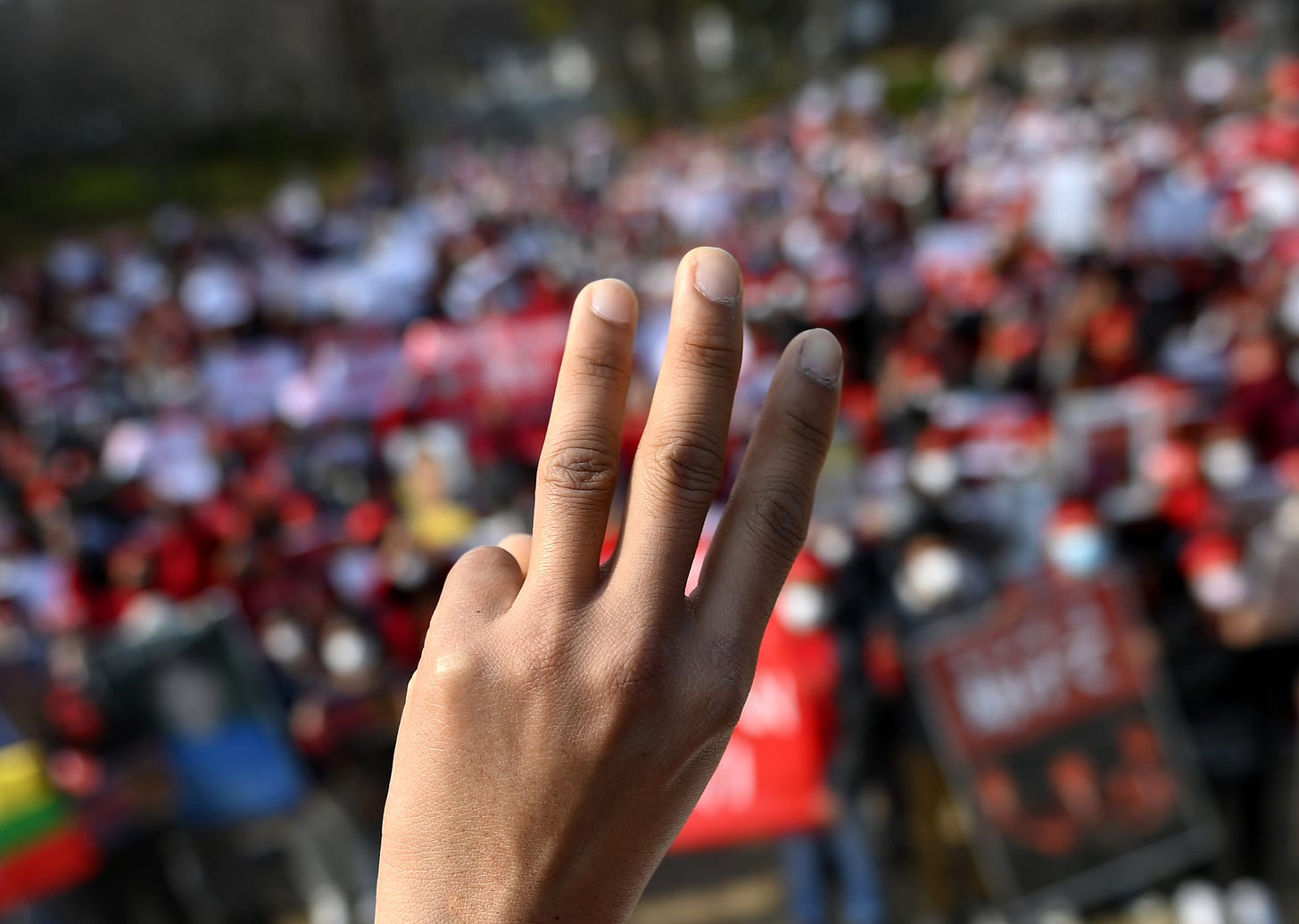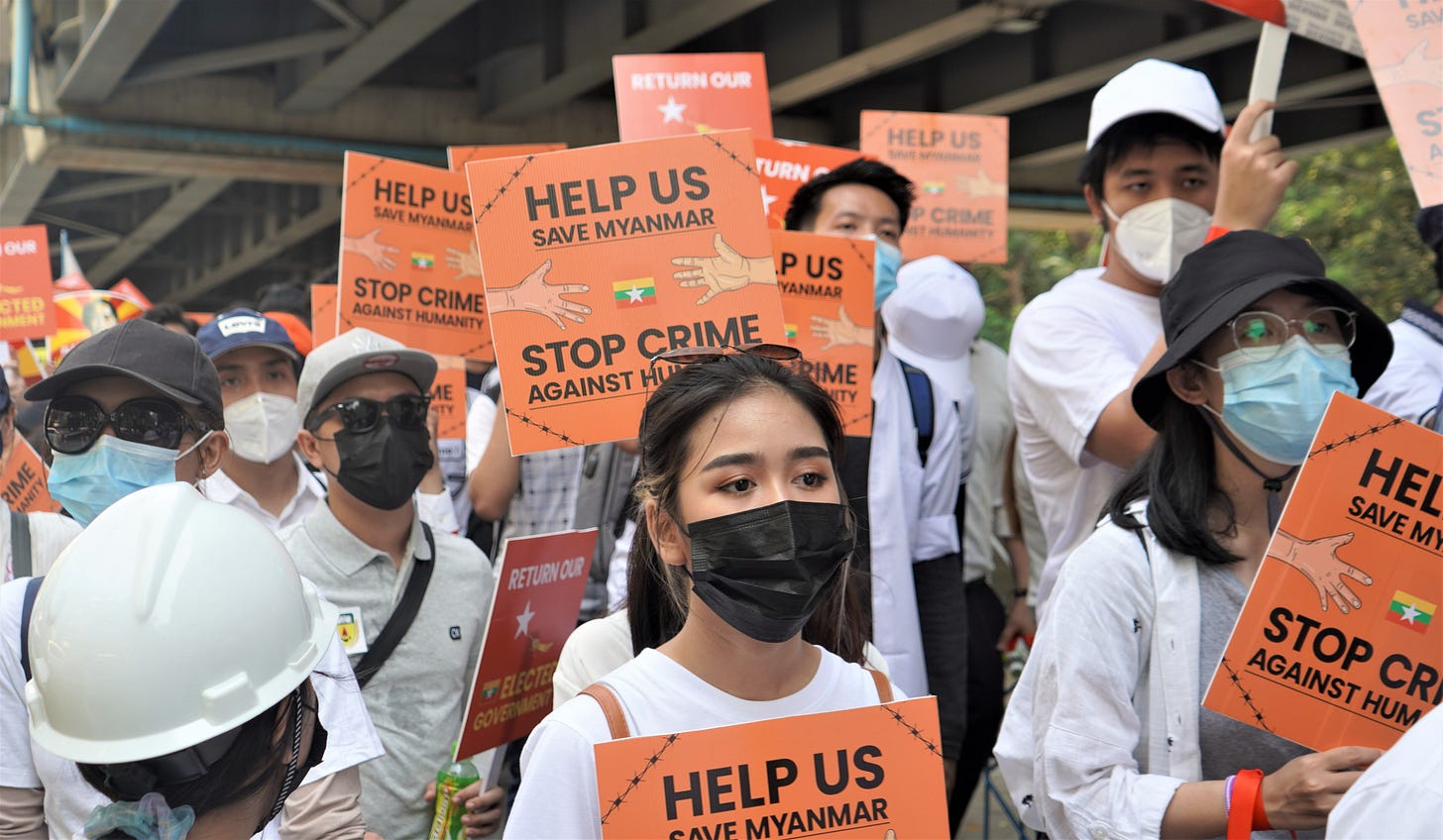Explainer: Myanmar 75 years after independence
Two years have already passed since the military coup d’état of February 2021. Will the country ever find its peace? An explainer piece to help you understand Myanmar’s situation and background.

In January 2023, Myanmar celebrated its 75 years independence anniversary from British colonial rule. Yet, 2 years ago already, the Myanmar military, also referred to as Tatmadaw, led a violent military coup d’état to overthrow the democratically elected party of Aung San Suu Kyi, the National League for Democracy (NLD). The country has been bleeding ever since with the Tatmadaw having committed numerous crimes against humanity and human rights violations.
ABOUT MYANMAR
Capital: Naypyidaw
Largest City: Yangon
Religions: Buddhism, Christianity, Islam, Others
Population: 57,526,449
Surface Area: 676,570 km2
Official Language: Burmese
Human Freedom Index: 5.78
Government: Parliamentary republic under a military junta
Total Number of Deaths since the 2021 coup: Over 3,000 people
Total Number of People Detained since the 2021 coup: Over 17,000 people
WHAT HAPPENED TO MYANMAR IN 2021?
On the 1st of February 2021, the democratically and newly elected Myanmar government of the NLD and its State Counsellor, Aung San Suu Kyi, were overthrown by Senior General Min Aung Hlaing and its military troops' successful coup d’état.
But what is a coup d’état? According to Cambridge University Dictionary, a coup d’état is the “sudden defeat of a government through illegal force by a small group, often a military one”.
The coup was initiated as a result of the military’s proxy political party’s defeat, The Union Solidarity and Development Party (USDP), during the general elections of 2020. As a result, the military had accused the NLD of having corrupted the voting results, despite the party having won by a landslide. Suu Kyi was immediately arrested and charged with various criminal offences along with other party members. She has been under house arrest ever since.
Since the start of the coup, the military has been using violence to impose and re-gain its power. From mass killings, to cold blood executions, arbitrary arrests, sexual abuse, torture, and targetting civilians directly. Two years later, according to The Council on Foreign Relations, more than 3,000 people have been killed, over 17,000 detained.
But Myanmar has a long and heavy history with military rule.
After the country’s independence in 1948, the country became a parliamentary democracy. In 1962, General Ne Win decided to throw the first coup in the country’s history which would last for 26 years. This led to a historical period of economic isolationism and civil war for Myanmar.
In 1990, the military decided to run a general election. Unfortunately, Suu Kyi and her party stood no chance due to electoral fraud. The military’s rule extended for another 25 years.
Even after the 2015 general elections and the NLD’s victory, the military still had control over a lot of the domestic and foreign relations and policy in the background.
Sam Jahan, AFP News Agency journalist says, “You may call it that Myanmar had a democratic process between 2011 and 2021, but I would say that it was still massively controlled and that they still had a massive umbrella of how the military junta played its role behind Aung San Suu Kyi’s government.”
THE BURMESE WAY TO WHERE?
Until 2011, the junta held a very tight control over the country, not just politically but economically and ideologically as well.
The military’s political monopoly allowed them to install a strong isolationist economic policy involving that no foreign investments or companies were encouraged to settle into Myanmar. This nearly total international isolation was very damaging for the economy. This was also called the ‘Burmese way to socialism’. With that ideology came a deep-rooted anti-western feeling installed by the military.
“‘The Burmese Way to Socialism’ centered upon two issues, the social and economic ideology of the socialist system expounded by the military and the political means of implementing that system” (von der Mehden, 1963).
Two years after the 2021 coup, the country is at its worst.
The military’s control has been more devastating than ever before. Amid Covid-19 pandemic, the economic and healthcare status of the country was already at a low. Now, affected by its economic downfall and international blockade, the population is prevented from getting the humanitarian aid it desperately needs.
AUNG SUU KYI
Nobel Peace Prize winner in 1991, Aung San Suu Kyi has been an emblem of democracy over the years. Suu Kyi co-founded the NLD back in 1988 as a result of her role in the 8888 protests in the country.
In 1989 she became under house arrest until 2010 by the military, in power at the time. She enjoyed international and strong local support ever since. In 2015, she became the official leader of the NLD.
Due to the ongoing Rohingya crisis and the violence inflicted on them by the military, Suu Kyi lost international support when she failed to publicly punish these abusive actions.
Matthew Walton, Professor at the University of Toronto Researcher about Myanmar says: “She's always been rather conservative in her political views, and somewhat moralizing, and definitely not a champion of diversity, either of perspectives or of identities…Having said that, she was in a very difficult situation, which she assessed and decided she needed to find a way to work with the military, rather than against it.”
WHAT ABOUT THE INTERNATIONAL RESPONSE?
The international behavior towards Myanmar has often been criticised over the years. Since the last coup, the international community’s response has been judged insufficient. According to Professor Walton, “It's scandalous the look at the amount of direct military and economic aid countries like the US and UK have given to Ukraine, while doing virtually nothing to support the Burmese revolution…But there's no strategic interest, so we can't really expect more”
So far, the embargoes, sanctions, and speeches by the U.S., the E.U., or the U.N. to sentence the military’s crimes and human rights abuses have been inconclusive.
Today, the country’s future remains uncertain.
“I don’t think the world has forgotten about Myanmar, I believe that they are deliberately avoiding getting involved in Myanmar’s international problems”
- Sam Jahan





